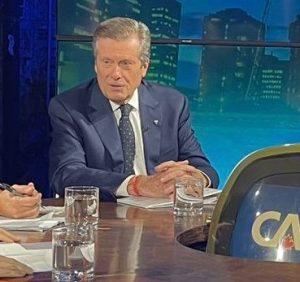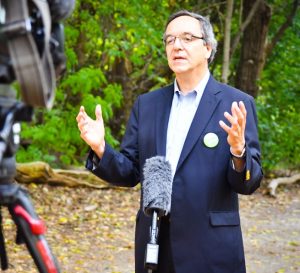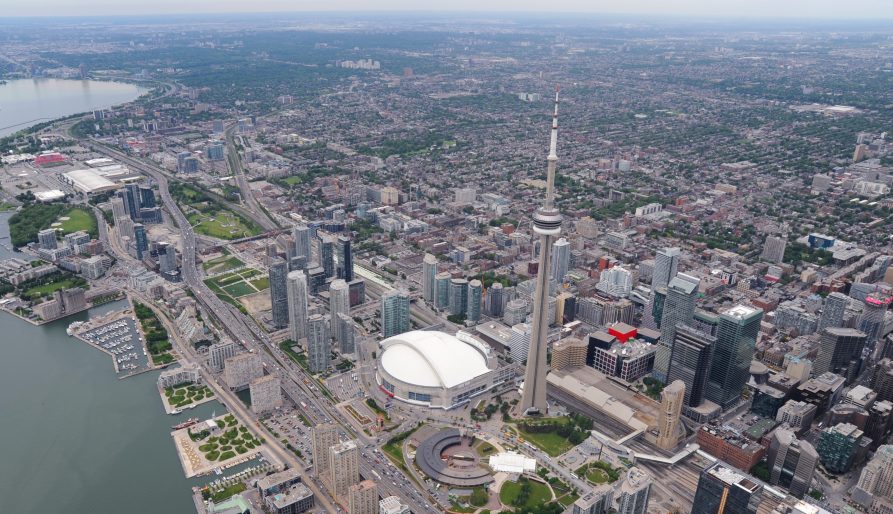Housing supply issues in Toronto have been central to campaign talks since dozens of mayoral hopefuls began rolling out their platforms weeks ago. With 31 candidates in the running, proposed solutions range from reducing development fees, to changing the city’s taxation system, to exploring innovative new technologies like 3D-printed homes. Will Toronto welcome a new mayor on October 24? That remains to be seen. In the meantime, here is a summary of the housing strategies proposed by four leading mayoral candidates as residents prepare to head to the polls.
 John Tory – “The Five-Point Housing Plan”
John Tory – “The Five-Point Housing Plan”
Incumbent Mayor John Tory has long been a vocal supporter of housing policies that speed up construction and bring more affordable homes to market faster. Having served as Progressive Conservative Party Leader between 2004 and 2009, Tory went on to win his first term as Toronto mayor in 2014, after defeating the current Ontario Premier, Doug Ford. Tory’s much-discussed five-point housing plan, released in late August, primarily aims to expand and speed up housing development.
“We’ve made strong progress over the past eight years to get housing built in Toronto, but to tackle increased affordability challenges brought on by a national housing shortage we need to build more homes, faster,” he said. “I’m proud to announce a five-point plan that builds on this progress by looking critically at where we can streamline and modernize processes at City Hall, and how we can incentivize our homebuilding partners to increase our housing supply and drive affordability.”
Measures in Tory’s five-point plan include cutting down on red tape and enabling the creation of more co-up, supportive, and affordable housing by allocating a portion of City-owned land to be developed by non-profits. If re-elected, Tory says he also intends to incentivize the construction of purpose-built rental housing by reducing fees and charges and prioritizing rental projects over other types of developments.
For more details on Tory’s five-point plan to increase housing supply, click here: johntory2022.ca
 Chloe Brown – “The Economics of Homebuilding”
Chloe Brown – “The Economics of Homebuilding”
Policy analyst Chloe Brown has worked in numerous sectors as the link between governments, employers, and service providers with a mandate to “create solutions for public services and clear pathways to opportunities.” If elected, Brown says her goal is to grow economic stability, accessibility, and modernize democracy in public services for the expanding working class.
Strategies outlined in her housing platform include switching from the city’s current property tax system to a land value tax, which would result in a lower tax rate for landlords of more than 2.49 per cent. This rate would then be levied to reduce monthly rent for the city’s financially strapped tenants.
Brown’s other measures include creating a rent-to-own program for first-time buyers struggling to enter the housing market; introducing zoning reforms for purpose-built, mixed-use and mixed-income rental properties to speed up the rate of construction; and investing in transit-oriented, high-density avenue development as opportunities for ‘Missing Middle’ housing.
“Regulatory barriers need to be removed to allow low-cost housing to be built in more expensive areas so that we can create high-opportunity communities throughout Toronto,” she said. “Also, changing the permitting and procurement systems to open these lands up to smaller and medium-sized builders would enable the creation of smaller to mid-size housing projects. Typically, it’s the massive projects developed by the largest builders that end up occupying these lands. This needs to change if we want to create more affordable housing options.”
For Brown’s full suite of measures, click here: cb4to.com
 Gil Penalosa – “Homes for Everyone”
Gil Penalosa – “Homes for Everyone”
Gil Penalosa is the founder and chair of the Canadian non-profit organization, 8 80 Cities; he is also the first ambassador of World Urban Parks, the international representative body for city parks, open spaces, and the recreation sector. Driven by a mandate to create vibrant, healthy, inclusive communities, Penalosa says his vision for improving Toronto’s affordable housing challenges includes leveraging the National Housing Strategy for homeowner loans to support conversions of single-family dwellings to multifamily housing. He also intends to revise zoning to allow additional storeys for purpose-built rentals designed with street-level commercial space, and to drop all development charges for a period of five years.
A big part of Penalosa’s plan to improve housing supply includes strengthening the City’s RentSafe program with new measures intended to help make rental homes safer and more affordable.
“Toronto’s tenants have been overlooked for too long,” said Penalosa. “Everyone deserves a safe, clean and healthy home that they can afford. My Stand Up for Tenants plan, which includes colour-coded RentSafe signs, rent-control in all city-funded units and more money to investigate fraudulent ‘renovictions,’ will protect tenants and encourage the construction of more rental housing.”
You can find more on Penalosa’s housing plan here: Gil Penalosa Releases Transformational Homes for Everyone Plan – Gil Penalosa for Mayor of Toronto (gilformayor.ca)
 Sarah Climenhaga – “Creating housing by all available means”
Sarah Climenhaga – “Creating housing by all available means”
Committed to a vision of a city that “thrives economically and environmentally,” Sarah Climenhaga has been involved with numerous grassroots initiatives in Toronto. She also ran for mayor of Toronto in 2018 and finished in sixth position.
Climenhaga’s housing policy calls for creating future housing by “all available means”. If elected, she aims to do away with restrictions that prevent people from easily renting out space in their homes, and to speed up timelines for repairs to both public housing and new rental construction.
“I believe a huge barrier to affordable and available rental units is the lack of supply,” she said. “This includes both housing units that are available but not being used—or not being used legally—and those that have not yet been created. For existing housing, I am interested in legalizing multi-tenant houses (i.e., rooming homes) and using the city’s vacancy tax to encourage property owners to put all available units on the market. To increase new supply, I’d like to eliminate as many of the 200,000 city bylaws as possible along with zoning restrictions that are standing in the way of the creation of rental units.”
Climenhaga adds that she wants the removal of these bylaws to be done without sacrificing the quality of housing and neighbourhoods, and that all-important green spaces must not be compromised as a means to increasing density. Instead, she wants to ensure that the City’s standards are clearer and easier to follow. She also intends to encourage out-of-the-box building techniques that incorporate green walls and vertical gardens, 3D-printed homes and tiny houses as additional housing solutions.
Visit her website to read more: Sarah Climenhaga – (votesarah.ca)





